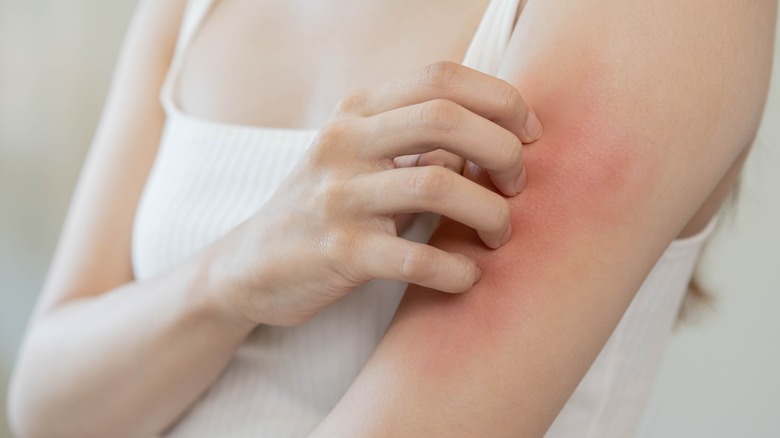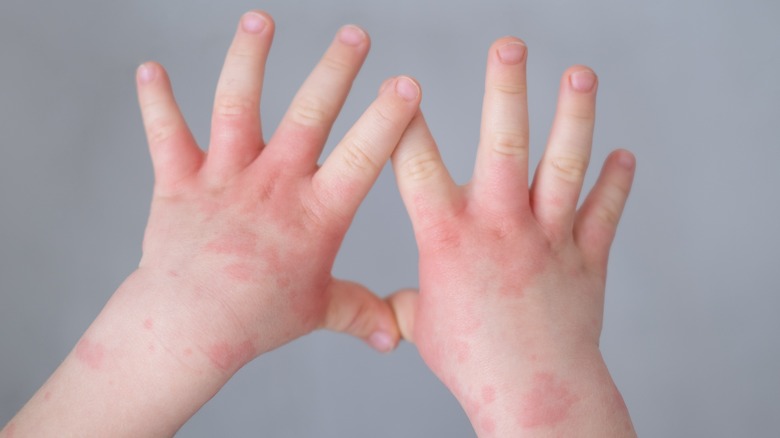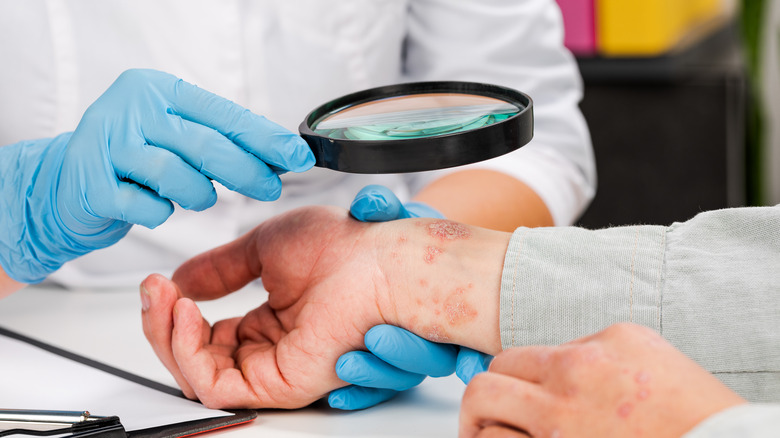What's The Difference Between Eczema And Psoriasis?
You've developed a new annoying itch, and it's driving you batty. Nothing you put on it seems to be clearing it up, so you're starting to wonder what the root cause of this insane itching is.
For most Americans, insistent dry and itchy skin comes from two different conditions: eczema and psoriasis. But these two conditions can be hard to tell apart and get misdiagnosed for one another quite often. While these two conditions might be similar, eczema and psoriasis differ in itch, onset, causes, and sometimes treatment. For example, a person with psoriasis might benefit from soaking up a little vitamin D on the beach, while someone with eczema might be donning a sun shirt and hat to keep cool.
Scratch the surface of the eczema vs. psoriasis debate by learning the subtle differences between these two skin conditions. It's sure to give you a better understanding before your appointment with the dermatologist.
The cause of eczema is complicated
Having an itch you can't seem to scratch away, and bumpy, irritated skin can be maddening. However, you're four times more likely to have eczema than psoriasis in the United States, so it's the perfect place to start when sleuthing out that mystery itch.
Eczema is the stealthier of the two ailments when it comes to knocking down a cause. This condition can come from environmental factors like foods, cosmetics, or even your climate; however, it might also be genetic. This can make narrowing down the cause more difficult. Additionally, doctor Jeffery Millstein of Penn Medicine noted that the itch between the two conditions is unique. "Psoriasis tends to cause milder itching and, in some less common types of psoriasis, a terrible burn. Eczema, on the other hand, can lead to very intense itching. When it starts to become severe, some people scratch their skin so hard that it bleeds."
Eczema and psoriasis also affect different demographics. Eczema is more commonly seen in children and develops earlier in life. While some kids might outgrow it, others might have it for the rest of their lives. Psoriasis, on the other hand, likes to show its ninja side by hitting the population later in life. According to the National Psoriasis Foundation, the symptoms of psoriasis start in older adolescents and young adults from about 15-25. However, psoriasis also has a few other distinct differences from eczema.
Psoriasis an itchy, autoimmune disorder
One thing that stands out about psoriasis is that it has a distinct cause. According to Dr. Millstein, "Psoriasis is an autoimmune disease, meaning your immune system is dysfunctional and your skin cells grow too fast. The cells start to pile up on the top of the skin, forming the white scale." While environmental factors can trigger a psoriasis flare-up or make the condition worse, the underlying cause and treatment are easier to pin down.
Psoriasis treatment is also another area where these conditions are drastically different. "For most psoriasis patients, abundant natural ultraviolet B (UVB) light from sunshine can be a blessing. UVB light can slow down the abnormal growth of skin cells. It is used as a medical treatment for psoriasis," noted Dr. Millstein. This isn't the case for eczema, though. Trying to treat eczema with sunlight can actually bring on a flare-up due to the heat making you sweat. Additionally, these conditions have their favorite areas of the body; eczema can be found pretty much anywhere but likes the elbows and knees, and psoriasis loves the scalp, hairline, and joint folds.
Psoriasis and eczema can be very similar in look and symptoms. However, they do have a few distinct differences, like who they affect, their causes, and their treatment. Rather than trying to self-diagnosis that itchy spot, it's always best to head to your dermatologist to get a diagnosis.


